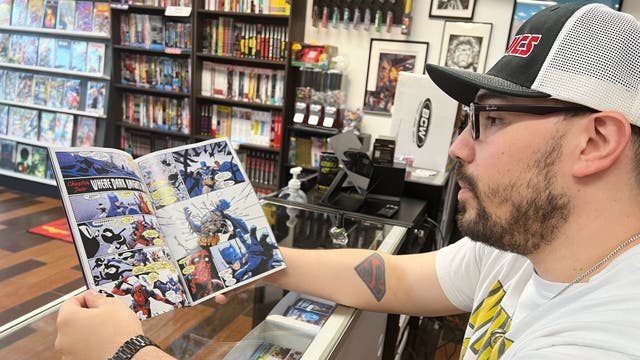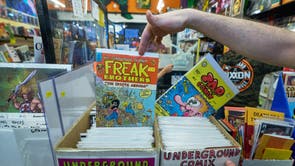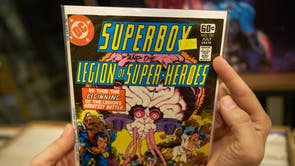- News
In the mid-20th century, comic books groups grew in popularity
Sophie AustinSaturday 22 November 2025 14:11 GMTComic books once stoked fears of crime, but a California city wants to confront that history
Show all 5




For free real time breaking news alerts sent straight to your inbox sign up to our breaking news emails
Sign up to our free breaking news emails
Sign up to our free breaking news emails
 Email*SIGN UP
Email*SIGN UPI would like to be emailed about offers, events and updates from The Independent. Read our Privacy notice
On a recent day at Sacramento native Lecho Lopez's comic shop in the city, his 5-year-old nephew read his first word aloud: “bad.” It was from a graphic novel.
There was irony in that being his first word, because Lopez credits comic books with many positive things in his life. That's why he supports repealing a city ordinance dating back to 1949 that bars the distribution of many comic books to kids and teens. It's not enforced today.
“It’s a silly law,” said Lopez, who has a red-and-black tattoo of the Superman logo on his forearm, in an interview at his store, JLA Comics. “A lot of good things come out of comic books."
A City Council committee unanimously voted this week to advance the repeal and designate the third week of September as “Sacramento Comic Book Week.” It now heads to the full council for a vote. The ban applies to comic books prominently featuring an account of crime that show images of illegal acts such as arson, murder or rape.
In the mid-20th century, as comic books were on the rise, fears spread over their impact on children, with some arguing they could lead to illiteracy or inspire violent crime. The industry decided to regulate itself, and local governments — from Los Angeles County to Lafayette, Louisiana — passed bans to shield certain comics from young people. While some cities like Sacramento still have those laws on the books, they are rarely if ever enforced.
Now, proponents of repealing the Sacramento law say it’s necessary to reflect the value of comics and help protect against a modern wave of book bans.
Local artist pushes for repeal
Comic book author Eben Burgoon, who started a petition to overturn Sacramento's ban, said comics “have this really valuable ability to speak truth to power.”
"These antiquated laws kind of set up this jeopardy where bad actors could work hard to make this medium imperiled,” he said at a hearing Tuesday held by the city council’s Law and Legislation Committee.
Sacramento is a great place to devote a week to celebrating comics, Burgoon said. The city has a “wonderful” comic book community, he said, and hosts CrockerCon, a comics showcase at a local art museum, every year.
Sam Helmick, president of the American Library Association, said “there is no good reason” to have a ban such as Sacramento's on the books, saying it “flies in the face of modern First Amendment norms.”
The history behind comic book bans
The movement to censor comics decades ago was not an aberration in U.S. history, said Jeff Trexler, interim director of the Comic Book Legal Defense Fund, which fights to protect the free-speech rights of people who read or make comics.
New York, for example, created a commission in the 1920s dedicated to reviewing films to determine whether they should be licensed for public viewing, based on whether they were “obscene” or “sacrilegious” and could “corrupt morals” or “incite crime," according to the state archives.
“Every time there’s a new medium or a new way of distributing a medium, there is an outrage and an attempt to suppress it,” Trexler said.
The California Supreme Court ruled in 1959 that a Los Angeles County policy banning the sale of so-called “crime” comic books to minors was unconstitutional because it was too broad. Sacramento's ban probably doesn't pass muster for the same reason, Trexler said.
There’s not a lot of recent research on whether there’s a link between comic books and violent behavior, said Christopher Ferguson, a professor of psychology at Stetson University in Florida. But, he said, similar research into television and video games has not shown a link to “clinically relevant changes in youth aggression or violent behavior.”
Comic-book lovers tout their benefits
Leafing through comics like EC Comics' “Epitaphs from the Abyss" and DC's and Marvel's collaboration "Batman/Deadpool," Lopez showed an Associated Press reporter images of characters smashing the windshield of a car, smacking someone across the face and attacking Batman using bows and arrows — the kinds of scenes that might be regulated if Sacramento's ban were enforced.
But comics with plot lines that include violence can contain positive messages, said Benjamin Morse, a media studies lecturer at the University of Nevada, Las Vegas.
“Spider-Man is a very mature concept," said Morse, who became an “X-Men” fan as a kid and later worked at Marvel for 10 years. "It’s a kid who’s lost his parents, his uncle dies to violence and he vows to basically be responsible.”
Lopez's mother bought him his first comic book, “Ultimate Spider-Man #1,” when he was around 9 years old, he said. But it was “Kingdom Come,” a comic featuring DC's Justice League, that changed his life at a young age, with its “hyper-realistic” art that looked like nothing he'd ever seen before, he said.
He said his interest in comic books helped him avoid getting involved with gangs growing up. They also improved his reading skills as someone with dyslexia.
“The only thing that I was really able to read that helped me absorb the information was comic books because you had a visual aid to help you explain what was going on in the book," Lopez said.
And a comic book can offer so much more, Burgoon said at this week’s hearing.
“It makes imaginative thinkers,” he said. “It does not make widespread delinquency. It does not make societal harm.”




